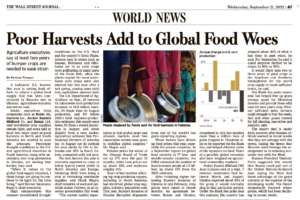As a result of the attack on Iran, nitrogen fertilizer at the port of New Orleans has seen an increase in price this week. Urea prices for barges in New…
“Lackluster” U.S. Harvest Impacting Global Food Supply Challenges, as Putin Calls up More Troops
Patrick Thomas reported in today’s Wall Street Journal that, “A lackluster U.S. harvest this year is setting back efforts to relieve a global food supply that has been constrained by Russia’s war in Ukraine, agriculture-industry executives said.
Senior executives from companies such as Bayer AG, Corteva Inc., Archer Daniels Midland Co. and Bunge Ltd. said worldwide crop supplies remain tight, and some said at least two more years of good harvests in North and South America are needed to ease the pressure.
“Persistent drought conditions in the U.S. and agricultural countries in South America, along with uncertainty over crop production in Ukraine, are making that harder, they said.”
Today’s article pointed out that, “The corn harvest this year is currently expected to come in below typical recent yields in North America and Europe, hindering 2022 from being a year of restocking worldwide supplies, said Chuck Magro, chief executive of seed and pesticide maker Corteva, at an investor presentation this week.

“‘The current market expectation is that global grain and oilseeds markets need two consecutive normal crop years to stabilize global supplies,’ Mr. Magro said.
“Futures prices for wheat at the Chicago Board of Trade are up 17% over the past 12 months, while corn prices are up about 28% and soybeans roughly 14%.”
Meanwhile, Dow Jones writer Kirk Maltais reported yesterday that, “Russia’s plans to annex Russian-occupied regions of Ukraine has CBOT wheat futures higher. The move signals more prolonged fighting in the nearly seven-month conflict.”
And today, Max Seddon, Henry Foy and Polina Ivanova reported at The Financial Times Online that, “Vladimir Putin said Russia’s armed forces would call up its reserves immediately to support its invasion of Ukraine and indicated Moscow would probably annex large swaths of the country’s territory.
“In an address to his nation that significantly raised the stakes in the war, the Russian president announced ‘partial mobilisation’ ahead of heavily stage-managed votes in four occupied regions of Ukraine to join Russia.”
Writing this morning at The Wall Street Journal Online, Alistair MacDonald indicated that, “The price of wheat and corn gained after Russian President Vladimir Putin threatened a nuclear response in Ukraine and ordered his country’s military reservists to mobilize.”
Also this week, Wall Street Journal writer William Mauldin reported yesterday that, “World leaders called for donating more money to fight hunger and lifting barriers to food and fertilizer trade to address what they fear will be a prolonged period of food insecurity linked to Russia’s war in Ukraine.
“At a special food meeting on the sidelines of the United Nations General Assembly, representatives from the European Union, Africa, and the Americas sought to draw attention to signs that the world’s food supply may face even bigger challenges in the future. They cited climate change, rising prices for energy and fertilizer and poor harvests linked to conflicts, including the one in Ukraine.
‘Next year may be even more difficult, looking at the increase in energy and fertilizer prices,’ German Chancellor Olaf Scholz said at the meeting.
Elsewhere, Reuters writer Pavel Polityuk reported this week that, “Ukraine’s grain exports are down 45.6% year-on-year in the 2022/23 season so far at 6.364 million tonnes, the agriculture ministry said on Monday.”
And a separate Reuters article yesterday by Pavel Polityuk indicated that, “Ukraine’s 2023 wheat harvest may decrease to 16-18 million tonnes from 19 million tonnes in 2022 due to an expected fall in the winter wheat sowing area, first deputy agriculture minister Taras Vysotskyi said on Tuesday.”
Also yesterday, Reuters News reported that, “A fourth vessel chartered by the United Nations World Food Programme (WFP), BC VANESSA, has arrived at Ukraine’s Black Sea port of Odesa and will deliver 30,000 tonnes of wheat to Afghanistan, Ukraine’s infrastructure ministry said on Tuesday.
“Ukraine has already shipped wheat to Ethiopia and Yemen under the programme. It aims to export a further 190,000 tonnes including this latest consignment for Afghanistan.”





